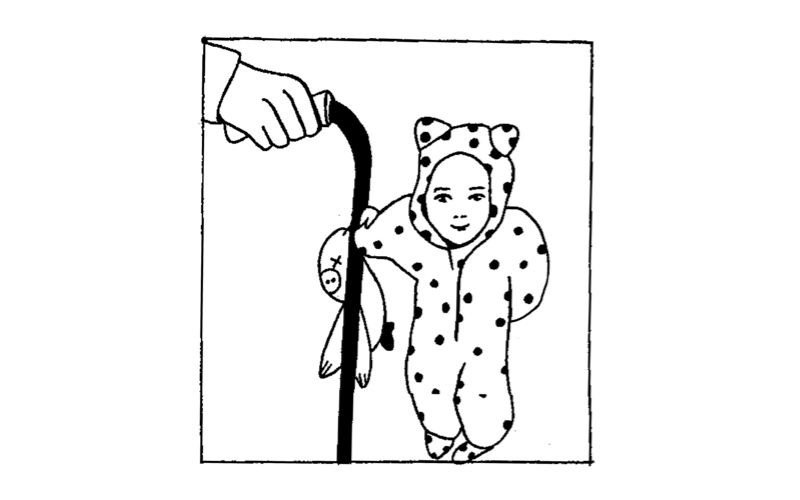Never Too Young to Help
My mother lived with us for the last two years of her life; she died shortly after achieving her 100th birthday. She was practically blind, could not hear, and was almost immobile. Her needs and wants became increasingly vocal as her frailness increased. It was sometimes very hard to cope. But the bright spots were the times when my two-year-old grandson Gregory came for the day, once or twice a week.
Gregory’s sunny nature and sense of humour lightened the rather heavy atmosphere in the house. Caring for someone at the beginning of his or her life is so different from nurturing someone at the end of life and facing death. Yet despite the 98 years between them, the two were well matched in many ways. They both needed frequent feeding with bland, easy-to-eat foods; some gentle entertaining; easy-to-understand books; simple activities; and regular and much-needed periods of rest and sleep. (Sometimes I was lucky enough to coordinate the two midday naps.) They both needed the assurance of my presence, quietly active with washing up, tidying, or just the sound of movement up and down the stairs. They both disliked me to be busy with something they didn’t understand, like the computer, the hated telephone, a conversation with another adult, or a book.
However, it was Gregory’s help that I learned to appreciate and miss when he was not around. He was very observant. He always found the hole in my stocking, or noted that more and more of my toe was coming out of the top of my favourite slipper. He quickly spotted when I left my keys out, my mobile phone on a chair, or my handbag on the floor, and he insisted on putting them all where they rightly belonged – into one of the toy boxes. He liked to make sure that all the cupboard doors in the kitchen were working well. The contents of the old-paper box had to be sorted and resorted until he was satisfied.
But it was in his care for Mother that he excelled. His first thought when coming to the house (after taking his shoes off) was to race upstairs as fast as his little legs could cope, calling out, “Gagi, Gagi!” (his name for Mother). She heard him as he called out, “Hallo, Hallo,” and stretched out her hand to where she thought he was. He seemed to sense that she could not see like we could, and without hesitation gently touched her shoulder or kissed her hand.
His acute hearing picked up the sound of her bell ringing or her voice calling for me, and he would turn to me with a worried look saying, “Gagi, Gagi.” Without him I might have missed those first urgent calls. He showed me the mystery and difficulty of getting hands through a sleeve, excitedly saying “Hallo!” when Mother’s hand finally appeared out of her cardigan. He liked to check that her hand bell was working and her cup of water was full. And her various biscuit tins had to be inspected and the contents sampled to see whether she would approve of them. He loved to help her empty her cake plate and then would concernedly give me the empty one to fill up again. When Mother was ready for her afternoon nap, he helped lift her feet up onto the bed. Then he would tiptoe away saying, “Gagi bed? Shush.”
The high spot of his day was “push time,” when we took Mother from her bedroom to her day room after her rest. He sat quietly while I got her ready; then when she was in her wheelchair, he helped push her, grunting and straining up with his arms so that his little hands could reach the handle, after carefully checking that there was nothing lying in our path to obstruct us. When we reached the day armchair, he would show her where she needed to put her hands. Then he would stand at her side, grunting along with her while she grunted in her effort to stand up and sit down. Once sitting, he was most concerned that she should not feel cold, and piled rugs, shawls and a cold hot water bottle upon her lap, all with more grunting and proud effort. Then he would push her table gently in front of her. Finally, he made sure I gave her the pot with her teeth, so that once again he could show me her empty biscuit plate.
They did not talk much together, but seemed to enjoy a quiet comradeship – the one sitting, the other quietly playing with his Legos or farmyard alongside her. Very occasionally I could hear her singing a nursery rhyme in a shaky voice, but mostly she just enjoyed touching and feeling his little hands.
Yes, I truly appreciated Gregory’s help. But it was his care, patience and understanding for my mother that I found so wonderful and that I regret I did not always have. We are never too young to help, and we are never too old to learn.
By Joanna Koch
Joanna is a La Leche League leader, a committed Granny to eight wonderful grandchildren, and proud to be a long-time member of the Mothering Matters Team.
Illustration by Chelsea Bider
This article first appeared in the March/April 2011 print issue of Mothering Matters.




